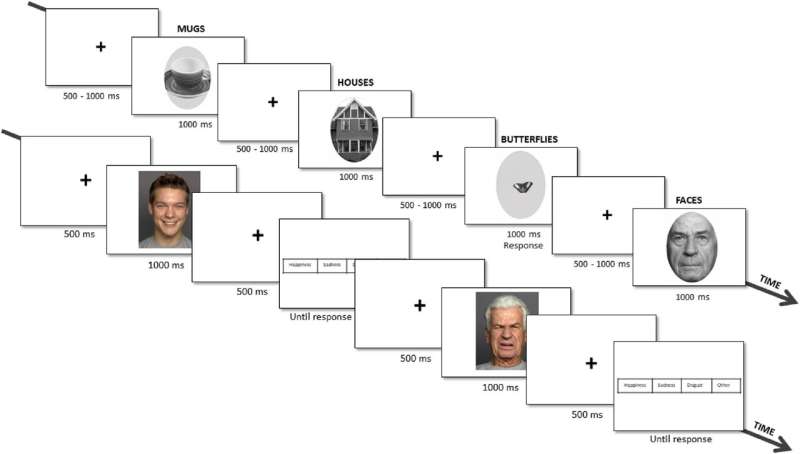This article has been reviewed according to Science X's editorial process and policies. Editors have highlighted the following attributes while ensuring the content's credibility:
fact-checked
peer-reviewed publication
proofread
Does aging change the way we interpret face processing of emotion?

Researchers analyzed the impact of aging on face processing and found that it may hamper the neural processing of facial expressions of emotion, and this difficulty may be intensified during the identification of emotions from the faces of older people.
Knowing that human faces are ubiquitous stimuli in our daily lives and an important source of social information, accurately inferring others' emotions from their faces could be the first step toward successful social interactions.
At any age, social isolation can have negative implications for well-being, however, in the elderly age group, the effects of low social interaction can be even more damaging, since it is known that older adults with stronger social relationships are less likely to decline in cognitive functions than their socially disengaged peers.
Although there are several studies on the role that facial processing can play in the health and well-being of the elderly, the effects of aging on this ability are not yet fully understood. Two meta-analyses showed that older adults are less accurate than younger adults at identifying facial expressions of anger, fear, sadness and surprise. However, less robust results were found for expressions of disgust and happiness.
João Marques-Teixeira and collaborators have carried out a study using a sample of 25 younger adults, 23 middle-aged adults and 25 older adults to perform two facial emotion identification tasks during an electroencephalogram (EEG). The results, presented in the article "Effects of aging on face processing: An ERP study of the own-age bias with neutral and emotional faces," published in Cortex, showed that aging affects face and emotional processing, consistent with previous reports.
The researchers from the Laboratory of Neuropsychophysiology of the Faculty of Psychology and Educational Sciences of the University of Porto found that elderly when compared to young adults, engage in additional neuronal activity during the visualization of facial expressions of emotion (happiness, sadness and disgust), as well as stimuli non-facials (such as houses, mugs, or butterflies).
João Marques-Teixeira emphasizes that the results obtained may have important social implications when it is verified that aging may hamper the neural processing of facial expressions of emotion and that this difficulty can be exacerbated during the identification of emotions from the faces of their own-age peers.
More information: Carina Fernandes et al, Effects of aging on face processing: An ERP study of the own-age bias with neutral and emotional faces, Cortex (2023). DOI: 10.1016/j.cortex.2023.01.007




















